College Admissions
College Admissions
Preparing for College
The Best College for You
What to Study
Applications
Education Options
Education Options
Private Universities
Public & State Universities
Community Colleges
Scholarships
Scholarships
African American Scholarships
Latino Scholarships
Native American Scholarships
Women Scholarships
College Grants
College Grants
Federal Grants
Merit Based Grants
Need Based Grants
Student Loans
Student Loans
Federal Student Loans
State Student Loans
No Co-signer Student Loans
Bad Credit Loans
Student Loan Consolidation
College Survival
College Survival
Financial Aid Tips
The Digital Student Blog
The internet has been abuzz the last couple of days after UK-based Birmingham City University announced it would offer a master’s degree level program in social media.
Eyebrows have been raised and critics on both sides of the concept have been weighing in on the idea that college students could soon be able to earn a graduate degree based on their knowledge and ability to use Facebook, MySpace, Twitter and Bebo.
The Program
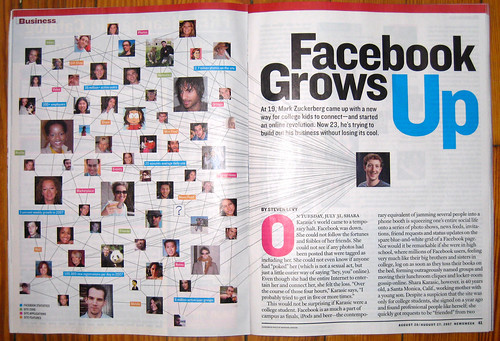 The one-year course in social media will explain how to set up blogs and publish podcasts in addition to focusing on social networking sites as communications and marketing tools.
The one-year course in social media will explain how to set up blogs and publish podcasts in addition to focusing on social networking sites as communications and marketing tools.
The designer of the program, Jon Hickman offered the following insights to the British media:
“During the course we will consider what people can do on Facebook and Twitter, and how they can be used for communication and marketing purposes. It’s not for freaks or IT geeks, the tools learned in this course will be accessible to many people.”
Required to conform to university academic standards, the course will “entail synoptic research and scholarly activity,” two fundamental criteria for approval for a Masters level program. The new concept will feature a mixture of lectures, seminars, research workshops, presentations and field-trips.
To earn a masters in social media, students will have to complete either a social media production project or an original piece of research in the form of a 15000-word dissertation.
The Basis for Providing a Program
As for a rationale for a graduate program in social media, Hickman went on to add:
“It’s very relevant and very scholarly. It’s a new course, but its importance is unquestionable.
“Social media is very important for jobs within the marketing and communications sector, as a skill set within other jobs, and as an industry within itself.”
Hickman is not the first to propose the future importance of social media. Michael Wesch, Assistant Professor of Cultural Anthropology at Kansas State, has often advocated that Facebook could be a useful tool in the educational setting.
Well-known for a number of YouTube videos that have taken the internet by storm, Wesch offers that as a university professor he has found Facebook to be very useful.
The professor understood long ago that Facebook was not only a great tool for expressing a person’s identity and sharing that identity with friends, the site provided all the tools necessary to create an online learning community.
Based on Wesch’s support for the use of Facebook, some have postured that all teacher training programs should involve some instruction in social media.
However, the Birmingham program will focus more on the business use of social media and using this new technology for commercial gain. Information available at the school’s web page also notes the new MA program will not only explore the techniques of social media as a creative industry but will seek to contribute new research and knowledge as to other potential uses for these networking sites.
Many Questioning the Instructional Value
Naturally, there are critics of the new program. Many people see social networking sites like Facebook or MySpace as nothing more than off-task behavior for today’s net generation. These critics find the idea that colleges have begun offering courses in social media nothing short of appalling.
 At the same time, the generation that has become dubbed as digital natives is wondering why anyone would need a course to learn how to socialize on Facebook or converse with Twitter. After announcing the program, Hickman could find a number of blogs that were insisting that the program as constructed was too basic.
At the same time, the generation that has become dubbed as digital natives is wondering why anyone would need a course to learn how to socialize on Facebook or converse with Twitter. After announcing the program, Hickman could find a number of blogs that were insisting that the program as constructed was too basic.
In addition, there was a question as to who would teach these courses as there certainly can not be any credentialed college professors who themselves have earned a degree in the social networking field. That led some to postulate that the students in the program would likely know more than those responsible for course instruction.
Indeed with such a cutting-edge program, knowledge would appear to be developing every day – in fact, as yet another critic postulated, the developments in social media are occurring so rapidly the program will likely be out-of-date before the first graduating class heads off into the sunset.
More details on the university set to break the mold are available here.
Flickr photos courtesy of Amit Gupta and Boris Veldhuijzen van Zanten.
When it comes to future careers, the reality is that most of us cannot even fathom what some of the more sophisticated job options will be. But if you want to put yourself on the cutting edge of technology and in a position to step into one of those careers that has yet not even been created, you may want to consider one of the following study options.
Microtechnology and Nanotechnology
When it comes to technology, the bottom line is that everything is getting smaller. From the miniature electronic accelerometers that trigger airbag deployments in autos to the incredible versatility built into today’s smartphones, technology is growing ever smaller even as it grows more sophisticated.
Perhaps no field holds greater promise for the future than the field of microtechnology. It is a career option that is so cutting edge that academic programming and degree options are just now being created.
Microtechnology is a concept that takes massive amounts of information and/or mechanical processes and then condenses them into a microchip for use in computers, mobile phones, medical devices, automobile computer systems, and security products. Items are made utilizing integrated circuit processing techniques and range in size from one-millionth (micro) to one-one thousandth (milli) of a meter.
 Moving even smaller is a separate field called nanotechnology. The prefix “nano” originates from a Greek word meaning one billionth of a specified unit. Therefore, nanotechnology is a subsection of microtechnology involving the study of objects that are 1,000 times smaller.
Moving even smaller is a separate field called nanotechnology. The prefix “nano” originates from a Greek word meaning one billionth of a specified unit. Therefore, nanotechnology is a subsection of microtechnology involving the study of objects that are 1,000 times smaller.
The construction of new nanotube-based components could ultimately revolutionize aeronautics. Carbon nanotubes (pictured right) are lighter than steel but 100 times stronger. Such materials will allow airplanes and spacecraft to fly higher while using less fuel and have led researchers to imagine a future with spy planes the size of insects.
People who work in the field are often called microtechnicians and of course span a broad range of industries. Potential career options range from medicine to defense systems and will likely involve every technical career in between. Ultimately, scientists believe this new technology will surpass the scope of the computer revolution, potentially affecting everything from the construction of batteries to the treatment of cancer.
The National Science Foundation estimates the U.S. will need 800,000 to 1 million nanotechnology workers over the next ten years. Because of those potential future demands, the foundation has established nanotechnology centers at six different universities, each conducting research in potential cutting-edge applications.
For some additional information on this cutting edge option, head on over to the Oklahoma State University web site.
Visual Representation of Complex Data
 The explosion in technology has made information gathering and collection much easier for researchers. In addition, scientific research is growing in complexity. The result can be a disconnect between the results of in-depth research and the ability of non-researchers to make sense of the data that has been created.
The explosion in technology has made information gathering and collection much easier for researchers. In addition, scientific research is growing in complexity. The result can be a disconnect between the results of in-depth research and the ability of non-researchers to make sense of the data that has been created.
Therefore, representing complex data for readers, whether it be citizens trying to make sense of information online or other researchers not versed in sophisticated mathematical operations, is a growing challenge. In simplest terms, the idea is to be able to accurately reflect numbers and facts in visual form to help the public and/or decision-makers interpret the data being presented.
Today, there are now courses and a field of study that examine visual representation methods and techniques all with an eye towards increasing the understanding of complex data. The field focuses in on how we humans process information visually and therefore looks at the best design practices for visualization. This unique career option crosses over into the world of computer programming languages yet offers some of the creative flair of the graphic arts field.
The field has even spawned an interactive visualization application program called Processing. The concept is putting an end to the over-reliance on traditional graphs and charts.
At Harvard, one course in data visualization has most elements available online for students interested in learning more about this career option.
Human-Computer Interaction
Yet another amazing cutting edge career option involves the push towards meshing technological capabilities with their human counterpart. An entire institute has been formed at Carnegie Mellon that has as its mission, “To understand and create technology that harmonizes with and improves human capabilities, goals, and social environments.”
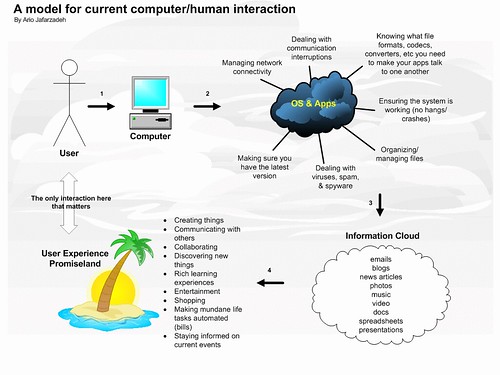 Looking to study the effects of computer science on society, these programs feature interdisciplinary research and education in computer design and the fields of behavioral and social science. In simplest terms, the field looks at the full cycle of our new exploding, information-rich society, and examines the effect of technology on how we adults work, play and communicate.
Looking to study the effects of computer science on society, these programs feature interdisciplinary research and education in computer design and the fields of behavioral and social science. In simplest terms, the field looks at the full cycle of our new exploding, information-rich society, and examines the effect of technology on how we adults work, play and communicate.
For those concerned that our technological advances are not leading to improved lives for individuals and groups, the field of human-computer interaction may just be the place to work. Ensuring that our technology does in fact improve the lives of citizens is as critical as the theoretical creation of new technologies.
For more on this incredibly important field, head on over to the Carnegie Mellon web site.
Flickr photos courtesy of St Stev, chromedecay and ario j.
The collapsing economy means that job prospects for this year’s college graduates are more competitive than at any previous time in our nation’s history. In these extraordinarily difficult times, members of the Class of 2009 are truly struggling to find meaningful entry-level employment options.
In addition, with many expecting the tough times to linger, members of the Class of 2010 may also want to begin thinking about one of these alternative paths. While often seen as unusual choices in other years, these four alternatives to the traditional workforce could be just the ticket for those having difficulty securing an entry-level position.
The AmeriCorps
One consideration for upcoming graduates is the AmeriCorps. In fact, if you have spent time being of service to others then you know just how rewarding community service type programs can be.
The program clearly focuses on a way of life that involves a commitment to others for a lifetime. In fact, as part of the AmeriCorps Pledge, participants are expected to not only pledge their support for the upcoming year but in the years ahead.
 In the Corps, there is a wide range of potential ways to serve. The application process begins with interested applicants filling out a form that focuses on their personal areas of interest. The second aspect offers applicants a chance to consider the specific location they wish to service.
In the Corps, there is a wide range of potential ways to serve. The application process begins with interested applicants filling out a form that focuses on their personal areas of interest. The second aspect offers applicants a chance to consider the specific location they wish to service.
The program offers more than 75,000 opportunities for “adults of all ages and backgrounds to serve through a network of partnerships with local and national nonprofit groups.” AmeriCorps provides individuals the opportunity to apply their skills and ideals with an eye towards meeting critical community needs.
Whether it be to tutor and mentor disadvantaged youth, improve health services or build affordable housing, the Americorps offers a wealth of opportunities that will help graduates gain valuable work experience.
One of the critical benefits of full-time members is a Segal AmeriCorps Education Award of $4,725. This sum may be used to pay for college, graduate school, or to pay back qualified student loans. Part-time corps’ members may receive a partial Award. In some cases, AmeriCorps members may also earn a small living allowance during the period that they provide their services.
In addition, the program offers qualified student loan forbearance. While interest continues to accrue on your loans during this period of forbearance, successful completion of your term of service can result in the payment of all or a portion of the interest that has accrued on qualified student loans during the service period.
AmeriCorps is made up of three main programs. The AmeriCorps State and National Program supports a broad range of local intensive service programs to meet critical community needs. For those interested in supporting organizations and public agencies to create and expand programs that build capacity and ultimately bring low-income individuals and communities out of poverty, there is the AmeriCorps VISTA program. And finally, the AmeriCorps NCCC (National Civilian Community Corps), a full-time residential program for men and women, ages 18-24, that seeks to strengthen communities while developing leadership traits.
While it is getting late for the Class of 2009, interested applicants may still find some limited opportunities available.
The Peace Corps
One of the oldest service programs, the Peace Corps began in 1960 with John F. Kennedy’s calls to service. As opposed to the Americorps focus on our own country, the Peace Corps is designed around the establishment of world peace through living and working in less-developed countries.
Today, the number of volunteers is nearing 200,000. Working on such important matters as AIDS education, information technology and the protection of the environment, those volunteers have served in 139 different countries. Ultimately, Peace Corps Volunteers “continue to help countless individuals who want to build a better life for themselves, their children, and their communities.”
 As with the AmeriCorps, the Peace Corps offers tangible benefits beyond those of skill development and the feeling of satisfaction that comes with helping others in need. Corps volunteers receive pay and living expenses, some vacation time, and transportation to and from the country of service. In addition, they also receive student loan deferment.
As with the AmeriCorps, the Peace Corps offers tangible benefits beyond those of skill development and the feeling of satisfaction that comes with helping others in need. Corps volunteers receive pay and living expenses, some vacation time, and transportation to and from the country of service. In addition, they also receive student loan deferment.
Those interested will also find a great array of potential service opportunities with each area offering many different options for duties and responsibilities. There are truly possibilities for every graduate irrespective of college major.
Peace Corps Volunteers work in the following areas: education, youth outreach, and community development; business development; agriculture and environment; health and HIV/AIDS; and information technology.
Perhaps the best aspect is that the Peace Corps accepts applications on a rolling basis. Therefore, there are still plenty of opportunities for 2009 grads to consider.
Teach for America
One of the most popular and competitive options is Teach for America. Program spots are limited and the number of applications has been going up every year, but the financial benefits of the program are significantly higher than either the aforementioned AmeriCorps or Peace Corps positions.
The program also features essentially only one option, teaching. The goal of the program is to bring the nation’s best and brightest to the classroom in an effort to end educational inequity.
 Teach For America is currently a member of the AmeriCorps programs and therefore currently offers corps members who have not served previously as AmeriCorps members the traditional benefits of loan forbearance (the postponement of loan payments) and an education award of $4,725 at the end of each year of service (a potential of $9,450 over the two years), that may be used for future educational expenses or towards the repayment of qualified student loans.
Teach For America is currently a member of the AmeriCorps programs and therefore currently offers corps members who have not served previously as AmeriCorps members the traditional benefits of loan forbearance (the postponement of loan payments) and an education award of $4,725 at the end of each year of service (a potential of $9,450 over the two years), that may be used for future educational expenses or towards the repayment of qualified student loans.
In addition, Teach for America Corps members receive the same salaries and health benefits as other beginning teachers. Corps members teaching in urban sites can effectively see starting salaries of anywhere from $30,000 to a high of $47,000 while those placed in a rural area would typically earn somewhere between $27,000 and $45,000. These salaries are also dependent on degree qualifications with the higher sums available only to those who have earned a graduate degree.
New applications for the 2009 fall year are now closed but those interested in the program will soon be able to pursue opportunities for 2010.
Graduate School
One of the fall back positions for undergraduates has always been graduate school. Entry allows students loan forbearance, a critical development for those unable to secure meaningful employment.
Adding to the luster of graduate school options, several schools have responded to the current situation facing graduates. For example in the northeast, Worcester Polytechnic Institute and Northeastern University are offering significant tuition discounts for master’s degrees programs to both this year’s graduates as well as new alumni.
 What can make the graduate school option even more viable is to obtain an graduate level assistantship. Among the various options are Teaching Assistants (TAs), Research Assistants (RAs) and Service Assistants (SAs). Each may offer pay and/or tuition-room and board adjustments in return for your services.
What can make the graduate school option even more viable is to obtain an graduate level assistantship. Among the various options are Teaching Assistants (TAs), Research Assistants (RAs) and Service Assistants (SAs). Each may offer pay and/or tuition-room and board adjustments in return for your services.
One truly great option is a program that features a partnership between the Peace Corps and a number of colleges and universities across the US. The partnership offers master’s degree level academic credit at more than 50 colleges and universities as well as financial incentives for Peace Corps service.
In addition, another Fellows/USA program offers scholarships or reduced tuition at more than 40 participating schools. Ultimately, the Peace Corps partnership program offers students the best of two worlds, viable and personally rewarding service experiences and the foundation of a meaningful graduate program.
Think Ahead
The exceedingly difficult job market certainly may have managed to sneak up on the Class of 2009. Though your opportunities are far more limited at this time, if you are struggling to find an entry-level position you should be sure to exhaust each of these service/study areas as well.
And if you are about to graduate in December of 2009 or the spring of 2010, you would definitely do yourself a great disservice by not examining the opportunities that may be available through these options.
Flickr photos courtesy of Sare-Bear, afagen, Monkey & Tree and Old Tasty.
Over the past year we have seen a number of posts that have taken issue with the importance of earning a college degree.
The Great College Hoax
In early February, Kathy Kristof, writing for Forbes.com, penned a piece called “The Great College Hoax.” It is an article that calls into question the linear relationship between a college degree and future prosperity.
To prove her point, Kristof highlights the story of Joel Kellum and Jennifer Coultas. Kellum, now 40, “did everything he was supposed to do to get ahead in life ” according to Kristof.
“He worked hard as a high schooler, got into the University of Virginia and graduated with a bachelor’s degree in history” before being “accepted into the California Western School of Law.”
 “Kellum couldn’t swing the $36,000 in annual tuition with financial aid and part-time work. So he did what friends and professors said was the smart move and took out $60,000 in student loans. Kellum’s law school sweetheart, Jennifer Coultas, did much the same.
“Kellum couldn’t swing the $36,000 in annual tuition with financial aid and part-time work. So he did what friends and professors said was the smart move and took out $60,000 in student loans. Kellum’s law school sweetheart, Jennifer Coultas, did much the same.
“By the time they graduated in 1995, the couple was $194,000 in debt. They eventually married and each landed a six-figure job. Yet even with Kellum moonlighting, they had to scrounge to come up with $145,000 in loan payments. With interest accruing at up to 12% a year, that whittled away only $21,000 in principal. Their remaining bill: $173,000 and counting.”
America’s Most Overrated Product: the Bachelor’s Degree
It was last May that career counselor Marty Nemko penned his powerful critique, “America’s Most Overrated Product: the Bachelor’s Degree,” for The Chronicle. He too calls into question the unrelenting push to earn a college diploma.
“Among my saddest moments as a career counselor is when I hear a story like this: ‘I wasn’t a good student in high school, but I wanted to prove that I can get a college diploma. I’d be the first one in my family to do it. But it’s been five years and $80,000, and I still have 45 credits to go.'”
Though he too is focused on the potential to pile up debt in the process, Nemko is more forceful about the entire process of pursuing a degree. He goes on to add, “Perhaps worst of all, even those who do manage to graduate too rarely end up in careers that require a college education. So it’s not surprising that when you hop into a cab or walk into a restaurant, you’re likely to meet workers who spent years and their family’s life savings on college, only to end up with a job they could have done as a high-school dropout.”
One Thing You Don’t Need To Be An Entrepreneur: A College Degree
 And most recently, venture capitalist Fred Wilson authored his “One Thing You Don’t Need To Be An Entrepreneur: A College Degree.” Wilson has much to say including:
And most recently, venture capitalist Fred Wilson authored his “One Thing You Don’t Need To Be An Entrepreneur: A College Degree.” Wilson has much to say including:
“I have learned that where someone went to college (or even if they didn’t go to college) has absolutely no correlation to whether they will be a good entrepreneur or not. I don’t pay attention to that part of a resume. I focus on what they’ve done in the work world, what they’ve shown they can do, and most importantly what they’ve done to date on that specific startup.”
Wilson points out a couple of real key facts about entrepreneurial life and that of other professions.
“Entrepreneurs don’t need degrees like lawyers and doctors do. They are credentialed by virtue of their track record. The first startup is hard but if they make that one work, they end up with something much better than a college degree. They have a notch in their belt. They’ve got a track record of success. Even if the first one is a failure, I’d say that they’ve got something more than a degree. They’ve shown they can start something from nothing, build a team, a product, and maybe even a business.”
A Change of Heart?
Perhaps you read these articles when they first appeared. If you did, then you likely had to be wondering, is the pursuit of a college diploma all it is cracked up to be.
If you did not read any of them when they first appeared but did read the highlights back to back to back as we just presented them, then you must now really be wondering. Is the dream of a college education really nothing more than a “Great Hoax?”
As life would have it, the answer is not quite so simple. The question is very complex and the answer varies from individual to individual and from situation to situation.
Not For Everyone
First it must be noted that a four-year college is not for everyone, not by a long shot. Even our sister education site has articulated that the idea that everyone should attend a four-year college “is a silly, misguided notion.”
If you are not truly interested in academics then it is hard to argue that you should spend the next four years of your life pursuing a bachelor’s degree. If reading and writing are not the ways you learn best, then four years of college are going to be a massive struggle.
The work demands associated with college study will be enormous and the intellectual challenges significant. And for the most part, the learning methodology will center on reading and writing, irrespective of the area of study. In a nutshell, you must have a strong academic background, an equally strong desire to succeed and the ability to learn from books and discussions.
 If instead, you learn best by doing, or by working with your hands, then you should consider something other than a four-year college and a bachelor’s degree. Look at one of the many two-year vocational schools that focus on a trade or a specific skill. These programs also have academic components, because the ability to read and write well are very important. But they will not be the core of the program – the trade or skill will form the major portion of your time.
If instead, you learn best by doing, or by working with your hands, then you should consider something other than a four-year college and a bachelor’s degree. Look at one of the many two-year vocational schools that focus on a trade or a specific skill. These programs also have academic components, because the ability to read and write well are very important. But they will not be the core of the program – the trade or skill will form the major portion of your time.
Not at all Costs
In addition to learning styles and goals, prospective students must understand the costs associated with higher education. Both Nemko and Kristof point to terrible stories of students racking up enormous debt in their pursuit of the coveted degree.
The friends and professors that advised Mr. Kellum and his wife to take out $60,000 in loans should not be called friends or advisers. Starting your careers with a combined debt approaching $200,000, as was the case with the Kellums, is indeed a recipe for disaster.
While earning that coveted diploma, students must be mindful of the debt they are incurring. The amount that is appropriate is dependent on future earnings. A prospective teacher will need to keep their debt much lower than say a person who is going to become a certified public accountant.
Ultimately, students must be careful not to mortgage their entire future by borrowing exorbitant sums of money while they are young.
Pursuing the Degree
When it comes to a summation of the responsible pursuit of a degree we turn to Daniel Tenner. He too has read “The Great College Hoax” and “One Thing You Don’t Need To Be An Entrepreneur” and the blogger has some great advice for prospective students:
“My opinion on the subject is simple: if you have a thirst for learning, and you don’t have to enter the workforce immediately (i.e. you can afford, somehow, a degree, without being financially irresponsible), then you absolutely should go to university, even if you have a start-up that you could work on right away. This is not because you need the degree for your future career, but because it’s a great thing to spend your next 4 years on.”
 With great wisdom, Tenner goes on to note several key points. First, “business ideas are a dime a dozen. Don’t worry about ideas. You’ll have just as many, if not more, ideas when you come out of college as when you went in.”
With great wisdom, Tenner goes on to note several key points. First, “business ideas are a dime a dozen. Don’t worry about ideas. You’ll have just as many, if not more, ideas when you come out of college as when you went in.”
Second, you can leave if you find that college is really not for you. If the learning approaches are simply not working for you or you do not have the academic preparation or the desire, then you can always decide to do something else.
However, for most students, including Tenner, college is an enjoyable way to spend four years. It is a place where many students first learn to be on their own yet do so while still having a significant support net around them. As the former student notes, college is essentially a “shelter where you can develop yourself.”
And most importantly, you will meet extremely interesting people (students and professors) even as you “learn things you would never have learned by yourself.” Tenner goes on to emphasize that college was the last place where he encountered people with the willingness and desire to teach him. Now the lessons come from the business world, and they, of course, now come in much harsher form.
The Importance of Higher Education
Earlier this week we noted the statistics related to the economic downturn and that the percentage of workers with a college degree who had been laid off was half of the national average. Many other articles point to the fact that those who earn a degree will earn substantially more over their lifetime.
A college degree does pay, provided one recognizes that the debt they accrue must be limited. But by a college degree, we mean the broadest set of options possible.
A technical, vocational, or associate’s degree also pays off. And in many instances, that form of degree is far more appropriate for specific individuals dependent upon their interests and life circumstances.
But even more than the financial piece, college can be a great place for students to learn about themselves and society as a whole. It is hard to argue against a place that helps students mature even as it serves to further develop their intellect.
When it comes to pursuing higher education, the key is not to get hung up on the four-year bachelor’s degree option as the only viable college experience or career preparation.
As for the question, “earning a college degree – is it really that important?” we finish with the words of Tenner who says it as well as anyone.
“If you can go to university without being financially irresponsible, then it is personally irresponsible not to.”
Flickr photos courtesy of H4NUM4N, Our Lady of Disgrace, McFlossy and laffy-4k.
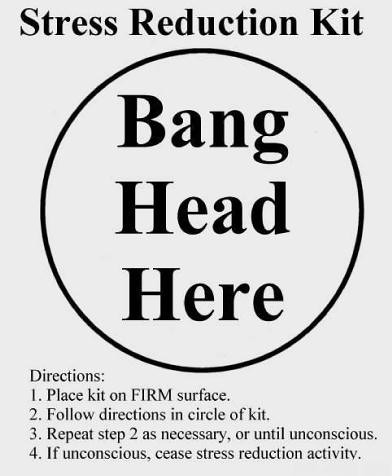
Facing a week with three prelims, a summary paper, and a class presentation? Then you are likely feeling a bit of stress.
Whereas once headbanging might have been the suggestion, now, thanks to the great world of YouTube, you are just a mouse click away from just the right stress reducer.
But be warned, these classics must be sipped slowly. Like fine wine, their sophistication means the taste may not emerge until the second or third glass from the same bottle.
A Silly Walk
The Monty Python crew was known for its clean mix of physical and intellectual comedy. One of the best is the sketch devoted to the Ministry of Silly Walks. If you have an upcoming important exam, take the few minutes to watch this gem. We even recommend you try one of these gaits as you walk to the test site so as to lighten the stressors. Of course, you really should find a partner to carry on the step, otherwise all the attention you draw might just be too much to bear.
Lumberjack Song
I’m a lumberjack and I’m OK also befits the crossdressing focus of Python. It is a catchy tune and the lyrics sung boisterously can certainly reduce anxiety. Of course, the beauty here is the creation of your own set of lyrics set to the tune, lyrics than you can return to time and again whenever it is time to calm those nerve ends.
Soccer Match
In one of the most brilliant of pieces, the Pythoners created this gem featuring the Germans and the Greeks. Using a taste of the old Steve Allen series where the writer would interview some historical figure in a talk show setting, this crafty video begs the question, who would be better at center-half, Aristotle or Socrates? Using a similar concept to help you remember any historical figures can make the mundane fun. We just prefer placing the subjects on the American football field where the thought becomes who plays quarterback and who in turn plays middle linebacker?
Argument Clinic
Of course, no Python review would be complete without visiting the Argument Clinic, with a quick early stop at Abuse. Here again a partner is critical. Either memorize the bit or simply wing it, just take ten minutes right before those exams are passed out to have an argument with your buddy. Score additional points if you can get beyond simple contradiction. We guarantee you will feel the butterflies emerging with every exchange.
Flickr photo courtesy of programwitch.
Every spring, another group of college seniors, ready to set off on the quest for permanent employment, begins the process of creating that all important document, their resume. Working with campus career offices, students begin to polish up what turns out to be one of the most critical components of the job search process.
The Importance of the Resume
Lindsey Pollak, a Gen Y career and workplace expert, notes that resumes will always play a prominent role in the hiring process. First, such documents serve a very clear purpose.
“Having one relatively standard resume format allows recruiters to compare apples to apples,” states Pollak. The career advice blogger also notes the importance of a specific or traditional format.
“I’m a big fan of the one-page resume because it requires job seekers to be clear and concise in selling themselves. It’s just not realistic for people to submit huge notebooks of information or 20-page bios when applying for jobs.”
Greening of Society
 Though resume creation will remain a right of passage for the foreseeable future, technology has begun rendering the long-standing traditional paper format less and less important. Pollak sees the traditional format as potentially giving way to its digital equivalent over the next ten years.
Though resume creation will remain a right of passage for the foreseeable future, technology has begun rendering the long-standing traditional paper format less and less important. Pollak sees the traditional format as potentially giving way to its digital equivalent over the next ten years.
Part of the reason is the current concerns of global warming and a renewed emphasis on the environment.
“One reason I think resumes may become obsolete is because of the amount of paper it wastes,” states Pollak. “We are moving toward an all-digital society, so it makes sense that fancy-paper resumes will go the way of the cassette tape.”
However, the author of Getting from College to Career: 90 Things to Do Before You Join the Real World sees the current social networking interests of students also being a key catalyst. The popularity of such networking has led more and more potential workers to pursue jobs through this environment.
Need for a Primary Format
However, the ‘apples to apples’ comparison aspect means that employers will likely want an agreed-upon format, one that will allow them to make distinctions between candidates. The need for one primary model has employers looking at the most popular and useful site created to date, LinkedIn.
“Already, recruiters are using LinkedIn to source talent,” states the frequent on-campus speaker. “It’s professional, but allows people more room to describe their accomplishments, post links to their work, demonstrate the depth of their professional network (very important for a sales position, for example) and include recommendations from past employers and colleagues.”
In other words, the site allows workers to collect meaningful info in one place, helping them become more than an SAT score or GPA.

Pollak, has shared her views on electronic resumes on her own blog site. Online formats will “allow job seekers to demonstrate their writing skills, the depth of their professional network, links to relevant work online, recommendations from employers and peers.”
While noting that LinkedIn leads the way, time could well change that as well.
“Employers seem to be happy with LinkedIn, and that site has certainly become the leader in the professional networking field,” states Pollak. “Of course in the future other sites might come along.”
Indeed, others are emerging, sites like Emurse.com and VisualCV.com. In the case of Emurse, you can create, share and store your resume online for free. Once created you can then share it with potential employers. VisualCV.com lets you share different versions of your resume with various employees, coworkers, and friends. VisualCV also allows a person to include video samples of their best work.
New Recruitment Process Emerging
The premise of online resumes could well change the job recruitment process entirely. Instead of employers posting an opening on a job board, their human resource office personnel will likely be scouring the web for potential workers that they might like to invite in for an interview.
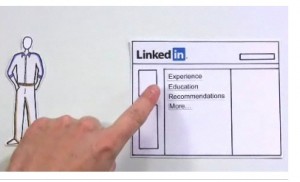 Pollak indicates that option is happening already.
Pollak indicates that option is happening already.
“Headhunters and recruiters are well aware of many candidates and they scour LinkedIn, Facebook, Twitter, Google and other places all the time,” she notes. “My own husband got recruited for his last job on LinkedIn!”
What makes the online resume environment even more enticing is the way that job matches are occurring.
“Right now, job matches are happening in a wide variety of ways, so savvy job seekers should pursue them all,” adds Pollak. “There is never a ‘guaranteed’ way to find a job, but I think we are very fortunate that right now there are so many potential places to look.”
Career Office
So seniors, as you head down to the campus career office this spring for the annual rite of passage, be sure to ask about LinkedIn and other possible social networking sites affiliated with your college. Today’s resume construction process means far more than developing a one page document on some fancy paper.
According to Pollak, it also means “reaching out to companies and recruiters, using headhunters, talking to people on airplanes, etc.”
And in today’s technology-oriented world, it also means “building a presence on social networks.”
A recent report card from the Josephson Institute paints current high school students in a very negative manner. Citing “entrenched habits of dishonesty” among young people, the survey of more than 30,000 high school students indicates that more students are lying, cheating, and stealing than ever before.
Ironically, we had a disillusioned student leave a comment on the site just after the report card was made public. Coming as a response to our article, The 11 Top Reasons Why Students Drop out of College, the writer not only revealed a significant level of discouragement, he offered a possible solution:
“I am Soooooooooo burned out of this entire experience!!! What would happen if I were to just say that I had the degree on my resume? Anyone ever tried that? How many employers actually check?”
Hopefully, it was a tongue-in-cheek response. But if it wasn’t……..
Honesty and Integrity
Whenever I hear someone propose such a solution, even when the option is thrown around in jest, I can’t help but turn to the very public and humiliating story of George O’Leary.
 During a seven-year period, O’Leary resurrected a moribund Georgia Tech football program. Guiding the team to five winning seasons in his final six years, O’Leary was named the Atlantic Coast Conference ‘Coach of the Year’ award in both 1998 and 2000, and was also named the ‘Bobby Dodd National Coach of the Year’ in 2000.
During a seven-year period, O’Leary resurrected a moribund Georgia Tech football program. Guiding the team to five winning seasons in his final six years, O’Leary was named the Atlantic Coast Conference ‘Coach of the Year’ award in both 1998 and 2000, and was also named the ‘Bobby Dodd National Coach of the Year’ in 2000.
In 2001, the University of Notre Dame, a proud academic institution that routinely graduates more than 90% percent of its student body, selected George O’Leary to be its new head football coach. His appointment resonated with Notre Dame boosters and football fans everywhere.
His selection was seen as an apparent “pull oneself up by the boot straps” kind of story that epitomized the American work ethic. An insignificant football player at a small university, O’Leary had languished long and hard as an assistant football coach before his revival of the football program at Georgia Tech.
Called the perfect candidate by school officials (right down to his Irish name), this hard-working, outstanding leader of young men was deemed the perfect choice to restore storied Notre Dame football to its former golden days. Yet, what began as a true “feel good” story rapidly disintegrated into one of the saddest of public moments for both a coach and an institution that prided itself on integrity and accomplishment.
Reporters Begin Checking Resume
First, one reporter, seeking to find some interesting quotes from the University of New Hampshire regarding O’Leary’s collegiate playing days, made a call to former members of the coaching staff at the school. The reporter was surprised to learn that no one on the coaching staff remembered O’Leary.
Further research failed to find any school records that verified that O’Leary had ever played football for the tiny Division 1AA program. Confronted with this information, O’Leary acknowledged he had embellished his resume.
No, he was not a three-time letter winner at the school as his resume indicated. Injuries and health problems had kept him from receiving any playing time.
Provided with this insight, Notre Dame initially stood by its candidate. After all, O’Leary was reported to be a man of integrity and his tenure as coach at Georgia Tech coincided with the school’s reemergence as a national football power. Notre Dame, at the assurances of O’Leary, were told that his embellishment of his playing record was a singular blunder and that there was nothing else for the university to be concerned with.
A Graduate Degree?
However, the University was soon confronted with further fabrication.
O’Leary’s resume included his having earned a masters degree from NYU in 1972. That graduate degree was extremely important because to work at the collegiate level, even as a coach, one generally must have some form of higher degree.
 Yet, it seems that once again Notre Dame’s candidate had taken the liberty to embellish his achievements. Though NYU acknowledged O’Leary had been a student there, their records indicated that he had never earned a graduate degree.
Yet, it seems that once again Notre Dame’s candidate had taken the liberty to embellish his achievements. Though NYU acknowledged O’Leary had been a student there, their records indicated that he had never earned a graduate degree.
Amazingly, these fabrications had been part of O’Leary’s resume since 1980 when he had filled out an application for an assistant coach position at Syracuse University. These concoctions had never been truly scrutinized until his appointment as head coach at one of America’s most storied institutions.
A stunned national sports audience read with great chagrin of O’Leary’s foibles and their effects on his coaching career. Elders at the time noted that once again ethical shortcomings in one’s youth had come back to not only haunt, but perhaps in this case, even destroy a man’s career.
At the time, much of George O’Leary’s amazing fall from grace was seen as a snapshot of what is wrong with collegiate athletics. O’Leary saw it differently, blaming it on ‘resume padding.’
In submitting his resignation to Notre Dame, one he had been asked to submit, he acknowledged: “In seeking employment I prepared a resume that contained inaccuracies regarding my completion of course work for a master’s degree and also my level of participation in football at my alma mater. These misstatements were never stricken from my resume or biographical sketch in later years.”
A Lesson for All
Any student thinking of falsifying his or her academic record or resume would do well to give careful consideration to the story of George O’Leary. There are numerous lessons that can be learned from the situation, not the least of which involved many, many years of hard work all undone in a matter of days because of ethical transgressions committed at an early age.
 Ironically, at the time, employers did not initially check on O’Leary – the checks were actually done by reporters seeking not to confirm or undo, but to report on what was believed to be an interesting and worthy story.
Ironically, at the time, employers did not initially check on O’Leary – the checks were actually done by reporters seeking not to confirm or undo, but to report on what was believed to be an interesting and worthy story.
However, since that time, public institutions began putting fact-checking measures in place. After all, no employer wants to ever be exposed to the public level of embarrassment the University of Notre Dame was subsequently subjected to.
In response to the earlier comment from one of readers, “What would happen if I were to just say that I had the degree on my resume? Anyone ever tried that? How many employers actually check?”
The answer is yes at least one notable person has tried it. And the second answer is yes, many employers now check.
As to “What would happen if I were just say that I had the degree on my resume?” Well, this story clearly reveals that blatant falsifications can come back to haunt you at the most inopportune time imaginable.
Flickr photos courtesy of MDB 28, Glenn and Telethon.
Ironically, most students who seek campus employment do so because of the desire to help fund their education. Yet, talking with two student bloggers, Amelia Possanza (2012) of Swarthmore College, and Yuri Ozeki (2009) from the University of Illinois, working on campus is an integral part of their overall college experience.
On Campus Employment
Amelia Possanza, a freshman at Swarthmore College, found the perfect work opportunity for her at the school’s performing arts center. Having done a great deal of technical theater work for fun in high school, Possanza utilized her prior experiences to secure a regular position at Swarthmore as a scene shop foreman.
The native of Pittsburgh has kept her hours to a minimum in the early going, especially given her involvement in athletics as a member of the swim team. In her first semester, Possanza does two shifts of two hours each week.
As for budgeting her time, Possanza learned in high school that doing school work for hours on end never really got her anywhere. “What works for me,” explains Possanza, “is studying for awhile and then doing some physical activity that allows my mind to mull over the concepts and sub-consciously work stuff out.”

The freshman minoring in Latin American Studies loves the physical nature of working and building sets. “Cutting wood and putting in screws gives me an opportunity to do something with my hands and take a break from mental exertion.”
Possanza also is quick to point out that she has learned a great deal from her work experiences, teachings that she might not otherwise receive in the classroom.
“Technical theater is all about problem solving, especially problem solving for problems that no one has ever encountered before,” she notes. “How can we make this plastic well look real? What can we attach to this metal bar to make it longer?”
“I love it because there is no right answer, only a method to approaching such problems.” As for gaining additional skills, Possanza adds, “I’m obtaining practical skills, such as saw use and drafting, that could help me get a transitional job in the future.”
Yuri Ozeki of the University of Illinois manages to hold down three on-campus jobs simultaneously. The senior works anywhere from 25-30 hours a week with a chunk of that time coming on weekends.
The bulk of Ozeki’s work hours come as a facility manager at the Urbana-Champaign’s Division of Campus Recreation. Her two older sisters worked at the facility when they attended Illinois and encouraged their younger sibling to consider it as well.
My campus recreation job is very flexible,” states the 22-year-old. “I work with other facility managers to create a work schedule that we are all happy with. Typically, I have two morning shifts during the work week, then, I try to pick up two weekend shifts.”
In addition to the 10 or 12 hours she spends each week at her campus recreation employment, the News-editorial journalism major puts in time as a writing intern at the University’s Office of Admissions. Though she has a relatively routine schedule, working four hours each Monday, Wednesday, and Friday, she acknowledges that the office has been very willing to recognize how important her education is to her.
“Some weeks, I have two or three class projects due,” the senior notes, “so I won’t work as much but then the next week, I’ll try to be in for longer shifts three times a week.”
To further her writing skills, Ozeki also took a copy-editing position at the campus newspaper, The Daily Illini. As a freshman, she also served as a reporter for the paper. “I work once a week and attend occasional meetings and training sessions,” she explains.
But while school is definitely her primary responsibility, Ozeki, like Possanza, insists that her work experience is rounding out her college education very nicely.
“My various jobs are really contributing to my education just as my classroom work is, so I see it as time well spent. When I’m working, I don’t necessary see it as ‘working’ or see it as something removed from my purpose of being in college: my education.”
Additional Peer Group
In addition to the overall work experience, each setting provides students another set of individuals to become acquainted with. Possanza acknowledges that her work in the theater does not bring her in contact with many classmates.
“I don’t work with many other students,” explains the Swarthmore freshman. “But the full-time technical theater crew that I work with is full of fairly young people who constantly teach me about new music. They also had very different college experiences than I did.”
“I have also met a few part-time people who are trying to start a career in technical theater, so they take on whatever jobs they can get. It’s so interesting to talk to people who are out in the ‘real world,’ especially since college can be such a bubble.”
For Ozeki, her work at the Daily Illini brings her into contact with fellow journalism majors. She notes, “It’s important to have a support network of people who are going through the same experiences.”
But she also quickly adds that her work at the Office of Admissions and Campus Recreation brings her into contact with people from many different fields. “Working with people who have different perspectives and ideas only help me to widen my skill sets and viewpoints,” she insists.
“At Campus Recreation, there is just a plethora of student employees. I really enjoy working there because it’s just a hub where a great variety of people are able to come together to accomplish the same goal. And our patrons and members are fellow students from every major and minor imaginable.”
Balancing Responsibilities
When it comes to balancing the responsibilities of school and work, both young ladies are clear that work actually helps them handle this task. Both also have schedules that would likely wear down the typical student.
 Possanza of course also has to budget extensive time for swim. “The swim season officially started at the end of September and runs until the end of February,” states the 18-year-old. “We have practice everyday, except Sundays, for two hours. Meets can take longer, especially if they’re away.”
Possanza of course also has to budget extensive time for swim. “The swim season officially started at the end of September and runs until the end of February,” states the 18-year-old. “We have practice everyday, except Sundays, for two hours. Meets can take longer, especially if they’re away.”
However, the freshman insists her schedule as constructed is very manageable.
“This semester the balance doesn’t seem too difficult because all first semester freshmen at Swarthmore are pass/fail,” adds Possanza. “But in the future I expect that this job will help with the balance.”
Ozeki acknowledges her preponderance of work time might be more than a bit unusual.
“I really just like working,” she says. “I keep piling on new jobs because I just enjoy new environments and working with new people. It sounds weird, but it’s true.”
Still she recognizes the need for budgeting her time accordingly.
“It can be difficult to manage study and work time, but it all comes down to prioritizing your responsibilities,” states Ozeki. “I’ve been fortunate enough to have very understanding employers and co-workers that know that some weeks are worse than others in terms of my work load.”
Getting the Most from College
Many students regard college as a full time commitment. Yet when pressed, those same students acknowledge that there is always time for other activities over the course of each week.
The question always comes down to what we do with those hours. Certainly, spending time socializing with peers is one of the preferred activities, both for its pure enjoyment as well as for taking one’s mind off the stresses associated with papers, prelims, and projects.
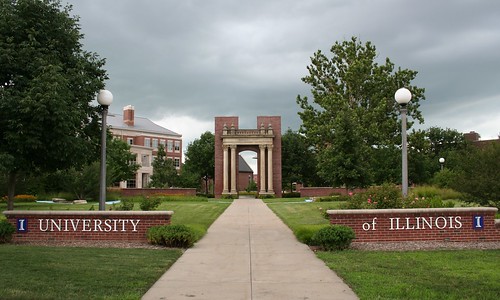 Yet, as Possanza and Ozeki point out, spending a few hours a week working can also provide a great break from the study routine. In addition, that work can provide a wealth of additional learning opportunities as well as an interesting set of new acquaintances.
Yet, as Possanza and Ozeki point out, spending a few hours a week working can also provide a great break from the study routine. In addition, that work can provide a wealth of additional learning opportunities as well as an interesting set of new acquaintances.
Given the costs of a college education, students should want to maximize their experience. Working in one of the many on-campus settings is one way to ensure that you get the most you can from your college years.
Flickr photos courtesy of Colin Purrington and almostincognito.
There is little doubt today that internships are a critical aspect of a college student’s preparation for future work opportunities. Not only do internships create a network of future employment options, a well-chosen opportunity will help you apply your knowledge and skills in a real work environment.
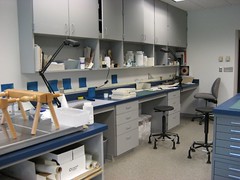 Most often, an internship is considered a trade-off, a swap of your time versus the chance to earn some serious cash. However, in today’s troubled economy, many students are finding that not only have the job opportunities dried up but internships are also exceedingly hard to come by as well.
Most often, an internship is considered a trade-off, a swap of your time versus the chance to earn some serious cash. However, in today’s troubled economy, many students are finding that not only have the job opportunities dried up but internships are also exceedingly hard to come by as well.
In tough economic times, you just might need to create your own prospects. Here are six steps to help you secure such an opportunity.
1. Talk to Your Professors: The first step is to let your professors and your advisor know you are looking for an internship. Simply stated, these folks have connections to a multitude of professional people. Not only might they know of a possible option, if these individuals know you well enough they might even lobby a colleague on your behalf. And there is always the chance they themselves might take an intern to help with a specific project or some research. But they cannot help you if they are not aware you are looking for an internship.
2. Talk to Your Parents and Extended Family: Ditto number one. Any working member of the family could have similar connections. More importantly, they could be your strongest lobbying agent for a position. Be aggressive and follow up on all possible leads.
3. Attend a Career Fair:  Take the time to attend a career fair to research companies that you would enjoy working for even if they are not hiring. Talk to the key people and introduce yourself, then get their card. Later, construct a letter of interest to the person you met that first indicates how impressed you were with the company followed up with indications that you would welcome an internship opportunity should anything become available.
Take the time to attend a career fair to research companies that you would enjoy working for even if they are not hiring. Talk to the key people and introduce yourself, then get their card. Later, construct a letter of interest to the person you met that first indicates how impressed you were with the company followed up with indications that you would welcome an internship opportunity should anything become available.
4. Consider Community Service: Yet another option is to examine those entities looking strictly for volunteers for some form of community service. Here again, think through the options so that you find a non-profit that would also offer you the chance to use your skills to help perform some additional meaningful opportunities. One student we know volunteered at a food bank. While the majority of the time was spent stocking shelves and doing inventories and paperwork, she was given the chance to use her technology skills to help set up a system to automate some of these tasks. While much of her time at first was unpaid, as time progressed the agency began to pay her for the hours she spent automating the agency’s record keeping.
5. Have a Polished Packet Ready: If you are going to pursue your own option, you must plan ahead and be fully prepared to submit a packet at a moment’s notice. Have your resume up to date and polished – use the campus career center to help you put together a quality product. In addition, have a roughed out cover letter that hits the basics about you but leaves room for you to tailor the letter to the company or person you are applying to. Resist using the same cover letter over and over again – to give the impression that you are totally interested in an opportunity with that company the letter must be unique to that business.
6. Do Mock Interviews:  Lastly, make an appointment at the career office at your school to conduct a mock interview. Try to get written feedback and go back to the dorm to rehearse further before doing yet another mock up. Try to get the second one taped if you can and again solicit written feedback to help you hone your skills. The bottom line, if there are four people interviewing for a possible internship, the one that makes the best impression will likely get the opportunity. A skilled performance can even overcome an average GPA.
Lastly, make an appointment at the career office at your school to conduct a mock interview. Try to get written feedback and go back to the dorm to rehearse further before doing yet another mock up. Try to get the second one taped if you can and again solicit written feedback to help you hone your skills. The bottom line, if there are four people interviewing for a possible internship, the one that makes the best impression will likely get the opportunity. A skilled performance can even overcome an average GPA.
Ultimately, in these tough economic times, be aggressive and prepared so as to seize the right opportunity when it presents itself.
Flickr photos courtesy of unforth, yngrich and vlasta2.
This past week, the results of a survey from Kaplan Inc. revealed that colleges have begun looking at potential applicants’ social-networking profiles such as Facebook and MySpace during the admissions process. According to Kaplan, 10% of admissions officers are now including a student’s social-networking site profile when making this important decision.
Perhaps even more important to students are two other figures, 38% and 25%, respectively. These are the percentages of profile pages that admission officials indicated ‘negatively affected’ their views of the applicant (38%) as compared to those that ‘positively affected’ their opinions (the 25%).
Profile and Privacy Settings
Given this development, students should give careful consideration as to the information and the photo(s) placed on their profile page. As for interests, it may seem humorous to list ‘wine, women, and song’ while that profile picture of you holding two cans of beer, even if done in jest, may seem harmless. However, face it, such information is not likely to set well with a college admissions officer or a potential employer.
As for your site, there is little doubt today that you should utilize the available privacy settings to ensure that only those you invite have access to the information on your page. This step is as important for your personal safety against online predators of various forms as it is to protect your basic image.
 But in regards to privacy options, students need to realize that group permissions for certain subgroups can expose you to other viewers. Accepting a group en mass might seem relatively innocuous (your elementary school classmates, for example) but such blanket permissions can inadvertently expose students to other site viewers that you might, in retrospect, wish did not have access to that information.
But in regards to privacy options, students need to realize that group permissions for certain subgroups can expose you to other viewers. Accepting a group en mass might seem relatively innocuous (your elementary school classmates, for example) but such blanket permissions can inadvertently expose students to other site viewers that you might, in retrospect, wish did not have access to that information.
Your Personal Brand
While students should use these privacy settings to limit outside access to personal information, it is important to realize that one of your most important steps in life today is the creation of your online image or brand. Today’s new media along with the capabilities of the Internet require students to think very carefully about the brand they want to cultivate.
And by brand, we mean the basic concept that is generally associated only with businesses. A brand in essence is “a collection of images and ideas” that goes on to “convey the essence of a company, product or service”. However, today it is being applied to you as an individual based on the image you create online.
In essence, every piece of personal information placed online is one step in creating your own personal collection of images and ideas (your brand). And since every piece of information on the Internet is archived or cached, any item you post has the potential to be accessed by others, including employers and college admission folks.
Most importantly, even if you decide to take it down later, it will remain available to the rest of the world on the Internet.
Two Simple Tests
 Therefore, it is imperative that students give very careful consideration to the brand they want to create. While it can sometimes be challenging to determine where the boundaries are in such matters, we have heard of two simple checks that will serve you well, the ‘Mom/Grand Mom’ check and the ‘Front-page’ check.
Therefore, it is imperative that students give very careful consideration to the brand they want to create. While it can sometimes be challenging to determine where the boundaries are in such matters, we have heard of two simple checks that will serve you well, the ‘Mom/Grand Mom’ check and the ‘Front-page’ check.
As silly as it may sound, when getting ready to post something online, ask yourself, what would your mother or grandmother think if they were to see the information? Is this something that would in any way serve to decrease their overall opinion of you? If the answer is yes, think twice about posting that information. Your future boss or that admissions counselor will have an even harsher view than your mother or grandmother.
The front page check likely sounds more sophisticated, it just asks you to consider a different audience. Ask yourself, what would happen if the information posted online were to make its way on to the front page of your local newspaper? Would it be a source of embarrassment or would it enhance your image in the community?
Though privacy settings give most users a certain level of comfort, the fact is that anything posted online will remain online for the indefinite future. Once there, it has the potential to be seen by others. So give very careful thought to everything you post.
To Cultivate Your Personal Brand
Because the material you place online can seriously impact your future opportunities you need to actively cultivate your personal brand. To ensure a positive presence online, give careful consideration to each of the following:
1. The Google Search Process – The first step to ensuring a positive brand is to imagine that someone is about to “Google” you. If they were to do so, what would the Google search engine turn up first?
 If it is your Facebook page, then examine that page carefully to ensure that what people see projects you in a positive light. Think of this page and your profile as being your online portfolio – include pictures of you working, performing, competing and volunteering as well as your resume. Include some written work that would help readers begin to understand who you are and what is important to you.
If it is your Facebook page, then examine that page carefully to ensure that what people see projects you in a positive light. Think of this page and your profile as being your online portfolio – include pictures of you working, performing, competing and volunteering as well as your resume. Include some written work that would help readers begin to understand who you are and what is important to you.
2. Creating your Own Web or Blog Page – Even better than a Facebook page, Kai Davis, a University of Oregon student and blogger, suggests you should create a separate web page or blog that features you at your best. With all the software options available on the Internet, setting up a page today is extremely easy.
Davis insists that the most important thing to remember “is to ‘own’ a search term in this digital age. Having a blog or a web page with some unique content, essays, discussion, resume, etc., will help position you above other candidates for jobs or internships.”
3. Buying a Domain Name – If you are ready to consider such a page, then you should think about buying a domain name as well. Workforce experts insist that “you should own a domain name that matches (as close as possible) your name.” The process of purchasing your name or one very similar is quite easy and relatively inexpensive. More importantly, it will provide you with your ‘own’ search term exactly as Davis describes.
Your Brand Matters
The bottom line is that the material you post has the potential to seriously impact your future opportunities. It might be during the college application/scholarship process or it could be much later when you turn to the world of work (or it could even come that fateful day you take the plunge and decide to run for political office).
Remember, your online brand does matter – be sure to treat it with the utmost care.
Flickr photos courtesy of Vicky Tgaw, SitMonkeySupreme, Jofus/JoeTheDough and AJC1.